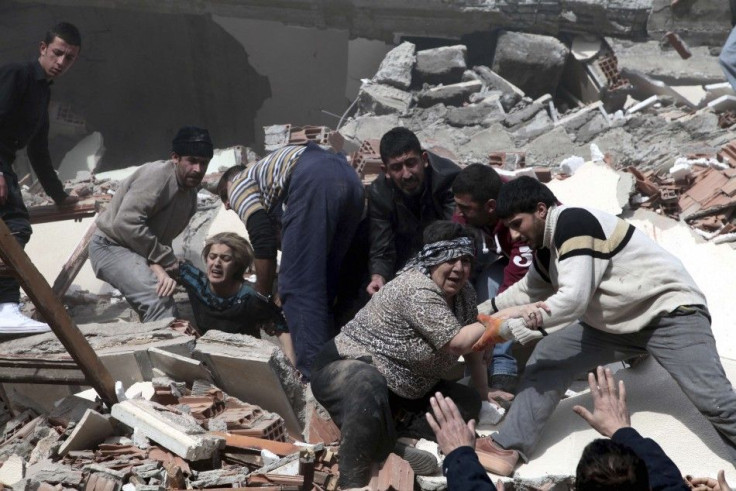Man's 4-day Survival Lifts Broken Turkish Hearts

The rescue of a man buried under rubble for more than 100 hours cheered grief-stricken survivors of the massive earthquake in southeast Turkey, as thousands endured a fifth freezing, wet night without a roof over their heads.
People left homeless by Sunday's 7.2 magnitude quake in the predominantly Kurdish eastern province of Van have complained bitterly over the slow delivery of relief in the early days of the disaster.
Drenched by pouring rain, more and more are falling sick, and with the first winter snows expected in November there is urgent need to get people under cover fast.
Praying that Friday will bring more tents and less rain, people in Ercis, the worst hit town, needed every bit of good news as hope ran out of finding any more survivors beneath the fallen buildings.
Hundreds of onlookers whooped with joy shouting Allahu Akbar -- God is greatest! -- when a rescue team from Azerbaijan pulled a young man out alive on Thursday evening.
Praise be to Allah! cried the uncle of 18-year-old Imdat, whose name means help in Turkish, as his nephew was stretchered to a waiting ambulance.
With most search operations beginning to wind down, some 185 people have been found alive under the collapsed buildings since the quake struck just before 2:00 p.m. (1100 GMT) on Sunday, according to an official count.
They could add to that one grey parrot that, according to state-run TRT television, was plucked from the rubble, shrieking in its cage a couple of hours after the young man.
As of late Thursday, the death toll was 535, with 2,300 people hurt in Turkey's biggest quake in more than a decade.
The numbers no-one seemed sure of were the homeless.
The International Federation of Red Cross and Red Crescent Societies put the number of affected people at 50,000 in a news release to raise funds for the relief effort
In Ercis alone, a town of around 100,000 people, it was clear that hardly anyone was going back to their property even if it was still standing.
Two or three tent cities have sprouted on the outskirts of Ercis, but thousands of men, having settled their children and womenfolk as best they can, wander the city at night looking for whatever shelter they can find. With nowhere to go they lean against walls to protect themselves from the rain.
TOLD TO GO HOME
Some survivors, who had stood in long queues only to be told there were no tents left, accused officials of handing aid to supporters of the ruling AK party. Others said profiteers were hoarding tents and reselling them.
Scuffles broke out in one long line to a distribution centre, before police stepped in to calm tempers.
Prime Minister Tayyip Erdogan visited the area hours after the disaster struck, and wants to build bridges with minority Kurds, and so any accusations of neglect or ineptitude are particularly politically sensitive.
More than 40,000 people have been killed in a Kurdish separatist insurgency in the region that has lasted three decades. Last week militants killed 24 troops in neighbouring Hakkari province.
A government that had thought it could manage the relief effort alone is now gratefully accepting foreign help in the shape of tents, prefabricated housing and containers.
The first planeloads of tents arrived on Thursday from France, Ukraine -- and Israel despite the poor relations between the two countries.
Unable to cope with the demand for tents, relief authorities in the provincial capital Van decided to hand out tents to people only after verifying that their homes were too unsafe to return to.
Vainly trying to dry linen and blankets after the rain, one mother of three was ready to be persuaded to quit her tent and go home out of a mixture of desperation and resignation.
Pointing at the block where she lived close to the city centre in Van, Nimet, the woman, in her forties, told Reuters: It looks fine from the outside, but inside it looks very unstable with all the cracks in the walls.
The university experts and the governor say go back to your houses, and if they are ready to take responsibilty we will go back. We are very cold, she said, dressed in the headscarf and long floral dress common across Anatolia.
What other choices do we have but to go back to our houses anyway. Last night, it rained and all our belongings are still wet. I don't know how many more days we can stay in a tent like this.
© Copyright Thomson Reuters 2024. All rights reserved.





















